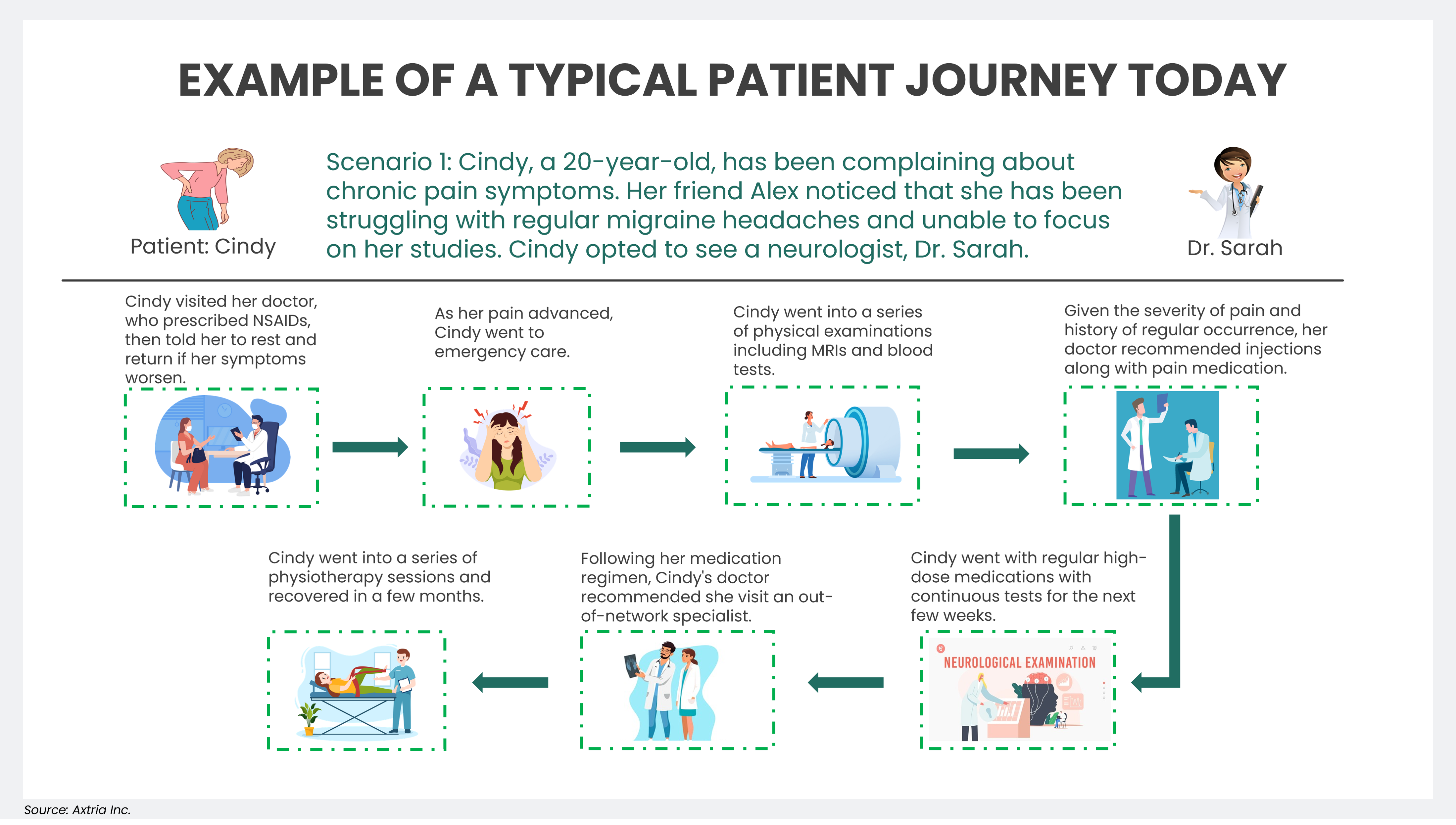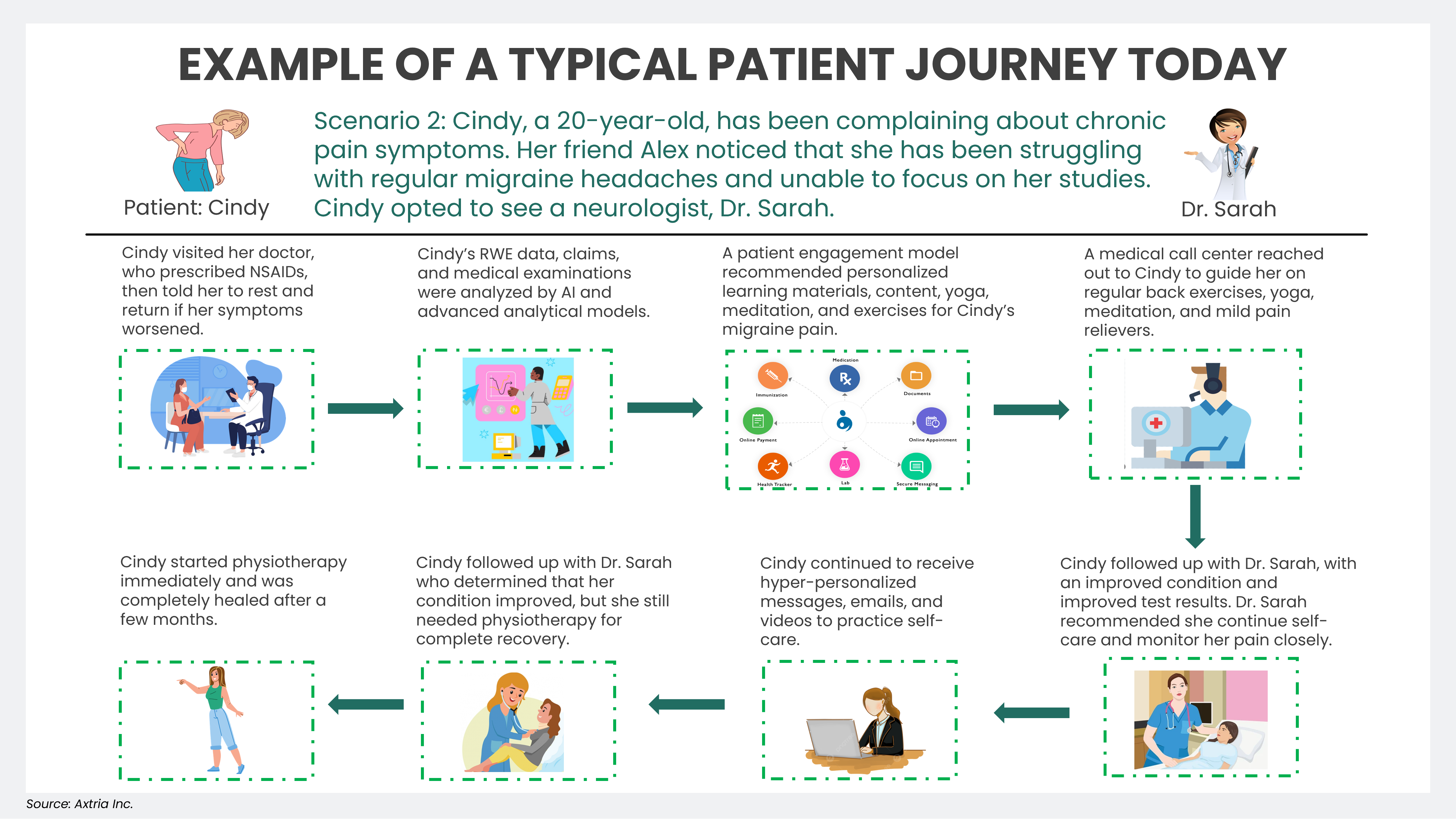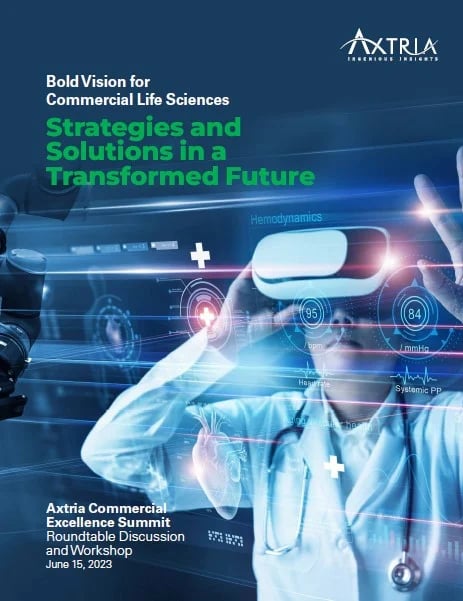Empowering the Patient Journey with AI-Driven Outcomes
Pharmaceutical companies are looking to redefine patient engagement for the future. The goal is to establish fresh avenues for communication and interaction with patients, enabling them to make informed decisions regarding high-quality care. By raising the standard of care and satisfaction for patients, as well as streamlining medical expenditures, these organizations aim to achieve optimal healthcare outcomes.
Success requires harnessing the power of advanced analytics and artificial intelligence (AI) to analyze and interpret patient data effectively. By leveraging these tools, pharma companies can unlock invaluable insights leading to more personalized and efficient patient care strategies.
It is estimated that digital capabilities could potentially slash medical costs in the United States by a substantial $175 billion to $220 billion annually.1 Moreover, pharmaceutical organizations actively collaborate with healthcare providers to develop the next level of personalized engagement throughout a patient’s care journey. The impact of tailored, simple messaging enhances the overall care experience and fosters enduring relationships with patients. In a value-based healthcare model, where reimbursement hinges on patient outcomes, optimizing the patient journey and care is paramount in showcasing the value of pharmaceutical products and services.
This innovative approach to patient outreach—straightforward, personalized messaging—also has the potential to cultivate enduring relationships with healthcare providers and other stakeholders, paving the way for collaboration and fostering growth.
 Figure 1: Typical journey of a patient experiencing chronic pain. The journey reflects how the patient goes through poor medical experiences and pays high out-of-pocket expenses with slow treatment.
Figure 1: Typical journey of a patient experiencing chronic pain. The journey reflects how the patient goes through poor medical experiences and pays high out-of-pocket expenses with slow treatment.
Through our engagements across numerous pharma clients, we have identified several essential elements to unlock and enhance the value of AI in improving patient journeys.
-
Advanced Analytics: Data science and analysis form the cornerstone of next-generation patient engagement. Leveraging extensive datasets such as real-world evidence (RWE), claims, and real-time patient vital data enables the monitoring of patient behavior. This facilitates rapid, multivariate testing of various patient experiences. Individualized analytics empower health insurers to pinpoint highly granular sources of value, among other applications. With machine learning and natural language processing, predictive modeling assists healthcare providers in anticipating patient needs, personalizing treatment plans, and optimizing resource allocation. Analyzing large datasets assists healthcare providers in streamlining and enhancing patient satisfaction, enabling proactive interventions and early detection of potential issues. This, in turn, leads to better outcomes and higher-quality care throughout the patient journey.
-
Consumer Engagement and Personalization: This involves leveraging business-to-customer approaches, supported by advanced analytics and enhanced by AI. It enables pharmaceutical companies to identify patients and engage with them through highly customized messages tailored to individual customers, delivered across both traditional and digital channels. According to a recent survey from McKinsey2, 70% of respondents preferred digital healthcare solutions over phone calls or in-person interactions, particularly after COVID-19. By leveraging third-party consumer data, RWE, web engagement, call center data, and AI models, the patient engagement model optimizes messages, channels, and timing for personalized connections. AI-driven algorithms identify patterns and correlations in patient data, enabling healthcare providers to understand disease progression and the best treatment moving forward. These insights allow healthcare providers to improve patient outcomes.
-
Enabling AI with Emotional Intelligence (EI): Our solution integrates AI with Emotional Intelligence (EI), establishing a direct line of communication with specific patients to address their concerns. Insights from emotional and behavioral economics guide their actions through nudges such as texts or reminder emails. This hyper-focused communication style is gaining traction across various industries to enhance customer satisfaction. Advanced analytics also ascertain a patient’s unique needs based on medical conditions, current emotional well-being, family background, and ethnicity, incorporating these factors when mapping their treatment journey. For instance, a 20-year-old man seeking oncology checkups and treatment will have different emotional needs than a 70-year-old man undergoing oncology diagnosis and checkups. Combined with artificial intelligence, empathy maps and EI highlight specific patient needs, aiding patient-focused engagement messaging, communication channels, and the model.

Figure 2: Improved patient journey thanks to proactive, hyper-personalized messaging on treatment. The result is higher patient satisfaction, lower out-of-pocket expenses, and long-term benefits by avoiding surgery.
Combining next-generation AI capabilities with advanced data science techniques holds tremendous potential to revolutionize patients’ treatment experiences. Integrating AI with EI can significantly enhance patient engagement, satisfaction, and adherence to treatment plans, offering empathetic support, personalized communication, and tailored recommendations based on emotional cues. This synergistic approach strengthens the patient-provider relationship and improves overall health outcomes by addressing physical and emotional needs. By prioritizing patient-centered care and leveraging cutting-edge technologies, healthcare providers can create a holistic and practical approach to patient care, ultimately improving patient well-being and satisfaction.
References
- Atluri V, Cordina J, Mango P, Velamoor S. McKinsey. How tech-enabled consumers are reordering the healthcare landscape. November 2016. Accessed March 19, 2024. https://www.mckinsey.com/industries/healthcare/our-insights/how-tech-enabled-consumers-are-reordering-the-healthcare-landscape
- Cordina J, et al. McKinsey. Healthcare consumerism 2018: An update on the journey. July 2018. Accessed March 19, 2024. https://www.mckinsey.com/industries/healthcare/our-insights/healthcare-consumerism-2018

Complete the brief form to download the white paper
Author details

Swati Mehta
Swati Mehta, as a Director at Axtria, plays a significant role in leading the Business Functional Group focusing on functional consulting services within Axtria. With 16 years of extensive experience, she specializes in enabling pharma global data management and reporting platform, demonstrating deep expertise across the pharmaceutical sales commercial and digital domains.

Abhishek Srivastava
Abhishek Srivastava, as Sr. Director at Axtria, is leading business development and pharma domain consulting engagements in Axtria. He has 15+ years of experience in the pharmaceutical life sciences sector, specializing in pharma sales commercial, omnichannel programs, and technical solutions encompassing data management, Master Data Management (MDM), and reporting.




